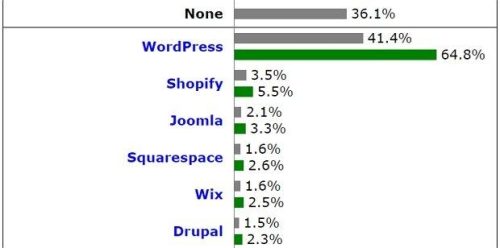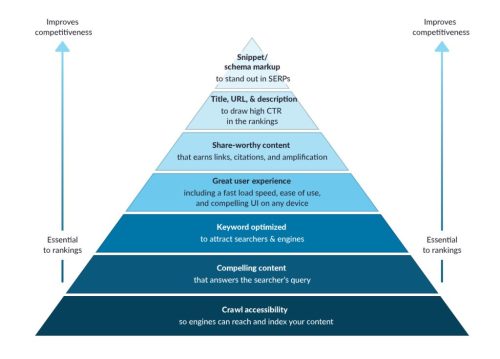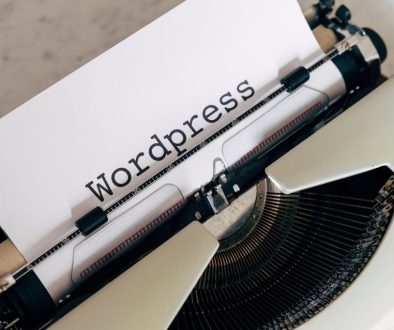Custom-Built Site vs. WordPress + Theme: Which is Better?
For everyone who decides to start their own website or completely revamp the old one, there’s one question that poses the most pressing concern: Should I do custom design or go with WordPress and select a theme?
The main difference between the two is that with a custom site you’ll have to literally build from scratch, while with WordPress, if you go with a WordPress, you get a website without almost no programming. Both options have their pros and cons and dance around the concept of money, speed to market vs perceived control.
In this article, we’re going to look into both options to help you decide how to proceed with your business website development.
Custom-Built Website
Custom-built websites are created literally from ground zero. As full custom products, they are able to tick every box on your list of must-have features. There is no design, look feel or even code to start with. Thus your own ideas of technology implementation is left up to you.
You are starting from a blank canvas, often in a design application like Adobe Photoshop. If you are a business owner, without a technical background or interest to learn, you are going to need to hire a professional developer, since building a custom site from scratch requires some serious knowledge.
This also mean you are going to have to reinvent all the tools, your marketing department needs to evaluate performance and ranking in all the major search engines. Be prepared, this is not a quick solution. This is going to be a major process and will also require a massive investment in documentation, work flow and the all important Quality Assurance.
Building a custom site from scratch requires some serious knowledge.

PROS
- Custom websites are unique. Unique in operation and flow from the point of view of the user. That can also be a negative, when customers have an expectation of use from other sites on the net.
- Custom websites are highly adaptable. You can make them fit your business needs perfectly, both in terms of design and functionality.
- They are SEO-friendly. Sure, you can optimize a theme-based site as well, but when you build from scratch, you’re able to build it lean and search engine friendly. SEO is more than just keywords, it’s actually about building a site so that the crawlers can read each of your pages properly. This can also be turned into a negative for long term support. See Cons for explanation.
- Custom-built websites are scalable. As your business grows, your website will need to grow and adapt as well. If you or your web developer implement the right technologies to allow for that growth, with limitations. See Cons for explanation.

CONS:
- Custom-built sites are more expensive.
Web Developers, IT and technologist are expensive, ranging from $80 to $175 a hour. Their skill set and knowledge is required in order to build a custom site that operates within a operational environment called the net. As such, your expenses for a custom website are , on a order of magnitude, much higher than implementing a WordPress CMS system and purchasing a good theme with associated plugins. Theme renewals, needed for the continual security and technological upgrades, usually run yearly. - Custom sites take longer to build.
It is going to take a year or more to go through all the stages of custom web development. To start, you are going to need to document what the site is going to do, what you want to achieve, how it will look, what industries requirements (like ADA, HIPPA or government) you need to address and what technology required.
Documentation is key to success. It is the blue print from which the developer will work from and QA tests against. It is a design and build process similar to building a house. Drawings have to be done, approvals need to be agreed upon and the technology to implement has to be confirmed. Building from scratch requires time. - Custom website require a least one, high end full time web developer on staff or retainer.
Their role will be to constantly keep the based technology current. Building a custom site, means you don’t have another team doing this work for you. Code must align with the latest rules and regulations world-wide, technical upgrades of the server technology and malware/security prevention. - Built in SEO means changing the core code.
Building in the SEO code into the theme, while making the site streamlined, also causes programming hell for any SEO manger and marketing department. Change orders and re-testing of the site for functionality will be required every time the SEO codes need to be modified. Traditionally, SEO codes need to be tweaked once a month. Thus SEO code changes turns into developer costs. - Expansion “Scalable” can turn into nightmare for the new staff and you.
Because the site was custom designed, you either have to keep your developer happy, so that they want to continue working with you or you are going to be left with finding someone else.
Rehires are not simple. The developer has to relearn everything that came before them. It also means you will be hearing editorials on the code that was previously written. Contrary to popular belief, programmer’s consider themselves artist with technology..everyone has an opinion. It takes an experienced confident developer to see the code for what it is, follow the organic design and make it work.
WordPress Website
Not all business want to invest in the cost and expense of a 100% custom website. Using WordPress, one of the many CMS Platforms, (Content Management System) is an excellent alternative. It is FREE with almost no programming. The work of programming has been done for you by the plugin developers, theme developers and the WordPress organization. That is the reason WordPress has been chosen for 64% of websites on the net.


PROS
- WordPress themes are more budget-friendly.
There are free themes you can use but there are a lot of premium themes that are actually quite affordable. - Sites using themes have much shorter development time.
If you’re working with a short timeframe, then using a WordPress can save you weeks or months. All the code is already there, you just have to tweak the design, add your content and your site is good to go. - Site can be changed quickly
With a proper theme choice, sites can be updated for color pallets, fonts, and responsive performance simply by the change of settings, on the back end of the theme. - Themes have “Builders”
A massive time saving process, is the builders that can be added or are included within the theme. Page and post development is now converted to a drag and drop experience with tools that allow you to view the page in all 4 display device types: Desktop, Tablet Landscape, Tablet Profile and mobile. This allows a more creative designer to take the wheels of the page and adjust it accordingly. - Thousands of fee and purchasable extensions.
It is like having a development team that you don’t have to pay. There are literally over 2,000 plugins/extensions to the WordPress system. Pick what you need and install. - Uses the #1 e-commerce solution in the world: Woocommerce.
With over 1 millions installs, the look and feel of how a e-purchase experience works for the viewer, has become familiar to the market place. This is an essential key to usability. Potential customers do not have to learn your website, in order to make a purchase. They know what is coming. thus leaving the comfortably factor already in place. They know how to do it. They trust the process. Psychology of usage is everything. - 99% of the time, no programming is required.
Unless you are doing something unique, there is no programming required. If you are and can not find a existing plugin to full-fill the need, you own custom WordPress plugin will be required. - There are thousands of developers for plugin customization & theme developments.
The price point, just by virtue of the system being a CMS and the #1 CMS system on the net, is much lower. For comparisons see WordPress vs. Joomal vs. Drupal

CONS
- Custom Plugin-standards can limit your custom implementations.
- Updates are frequent and constant
Using a CMS is not a build and forget it project. There are constant security upgrades, plugin upgrade that must be performed monthly in order to continue a proper display. - Plug-in can conflict resulting in high maintenance.
Because plug-in are built by 3rd party organizations, your particular combination of themes and plugin may cause a problem. Thus it is necessary to continually backup the site before upgrading. To correct such an error is an iterative process of elimination that can not be done by the non-technical. - The wrong developer can really mess you up!
There are a lot of developers out there who call themselves WordPress developer. They are paid an insane amount of money per hour with the average being $80 or around $80,000 per year for staff. (src: Codementor.io) dependent on location. Just because they can program in PHP or even MySQL, does not mean the have the background of how WordPress works.
The more experienced and skilled developers with a core understanding of WordPress, will run in the $100-$150 per hour. Understanding how WordPress works, is a key to any development. That includes how to implement new features properly using plug-ins AND follow the WordPress approval process. WordPress, as a organization, does require code reviews and testing in order to be used on any of their official sites or distributed through the library.

WORDPRESS MYTHS:
WordPress has a set of myths that many hard core developers are going to insist of perpetuating in favor of the more expensive self-development. That could be a deal point for many small to medium business to take the leap to the internet. For certain developers, it is threatening to have any CMS (Content Management System) replace the fun and profitable experience of new website development from scratch. Can you blame them!
- WordPress is less flexible.
Actually the opposite it true. With the proper implementation of expansive plugins, WordPress become the platform of unlimited flexibly while still keeping your site cost effective and supportable. Thousands of different themes are available, directly out of the box. - Web themes usually come with less support.
Also false. There are many companies out there who offer unlimited support for those themes and templates that they develop. One such company is Themify. Themify has staff support & developers around the world offering 24/7 support via their website. They will even code snippets for you, based on your own need. - WordPress themes are not automatically SEO-friendly.
WordPress is no more or less SEO friendly from a custom built website. SEO has a set of rules in order to become effective. Keywords are set in a header and matching words are in the copy. This is a manual process and thus requires customization in either implementation.

- WordPress themes do not require any special knowledge or skills.
Partially true, after the website has been setup an implemented. It is fairly simple for a website owner, marketing representative or web designer, to use on a day to day basis, requiring little to no guidance. However that is not the case to setup the site. The knowledge and understanding of HOW the technology works is essential to the proper function of the site at large. With the vast flexibility of the platform, knowing what to change and what can not be changed is the difference between unexpected results OR work seamlessly.
For example, a web developer, not understanding the design and function of WordPress,may try to code-in colors, fonts, removing the flexibility of the CMS. Thus changes for Marketing /Web designers is almost impossible to do quickly. And depending on the skill of the Developer, can even cause security and legal risks for the business. Some security coding mistakes are inserting into a theme with 3rd party links that control content for the user. This is a lack of understanding of the technology on the part of the developer is not a weakness of the WordPress CMS system. Flexibility by design, is also dangers in the wrong hands.

THE QUESTION TO ASK
Deciding which is the best solution for you really comes down to a single question:
What are you doing that is unique, relative to any other site on the internet?
What are you doing that is so unique from the rest of the internet?
It may appear to be a cold question, but is the only important one.
There are thousands and thousands of productive, revenue generating websites on the net. How is your intended site, so massively different, that it needs 100% custom development?
- Is the product or service, that you are offering . that so unique, from all of the sites on the internet, that is requires custom development and a continued long term investment?
- What online service is so individualized that a veering from understood viewer purchase experience is necessary?
- Is this a developer preference or practical assessment?
DEFINE "UNIQUE"
In this article “Unique” is not defined by what product or service you are selling, but rather how you present the product or service and how it is purchased. That purchase and usage flow. Of course your product and/or service is special! But how you present that product or service to the viewer may not be.
There is the key to your decision.
In fact, a different process from the industry standard, may detour possible customers, simply because they do not understand. The process is not familiar. Access has to be learned. Usage alone, can be the difference between fiscal long term success or failure.
Only you can answer the question of what is best for you.
At Multimedia Designs, LLC, we have done both, based on client preferences. We advise, you make the decisions. Call us for a independent evaluation of your present site or a quote for your new project.
Debbie Kurth
CEO & Technical Director of Multimedia Designs, LLC, System Designer, Developer, Producer with 15+ years in the internet design and development space and 25+ years in the Software Development for the entertainment industry. Winner of the prestigious International Themed Entertainment Association award for interactive design. She holds a degree in Computer Engineering & Mathematics from California State University, Long Beach.





